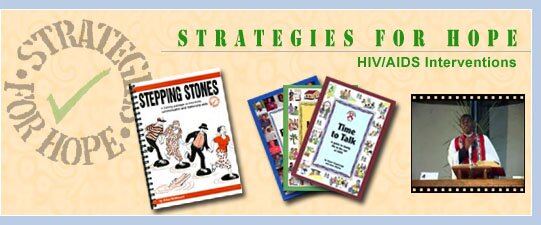 |

|
The purpose of the monthly Spotlight is to showcase health communication materials that have had proven impact.
|
|
 |
STRATEGIES FOR HOPE HIV/AIDS INTERVENTIONS
The Strategies for Hope series aims to promote informed, effective, community-based approaches to HIV/AIDS, gender and sexual health, particularly in sub-Saharan Africa. Strategies for Hope (SFH) has so far produced 18 books, five videos, and the Stepping Stones training package which is featured here with the Called to Care Toolkit and the What Can I Do? film:
|
CALLED TO CARE TOOLKIT
This toolkit consists of practical, action-oriented booklets and mini-manuals on issues related to HIV/AIDS, designed for use by church leaders, especially in sub-Saharan Africa.
|

|
 |
 |
 |
WHAT CAN I DO? VIDEO
This video, designed to combat HIV-related stigma, shame, discrimination and denial in churches, features Canon Gideon Byamugisha from Uganda - the first African priest to disclose his HIV-positive status. Canon Gideon talks about the need for his fellow Christians to do away with judgemental attitudes towards HIV-positive people, and instead to offer them love and support.
|
To obtain copies of Strategies for Hope materials, contact Teaching-aids at Low Cost or the Strategies for Hope Trust.
Strategies for Hope materials have been distributed to over 160 countries; they are used for information, training, planning and advocacy purposes by a wide range of organisations and individuals, including health institutions, NGOs, community groups, international agencies, faith-based organisations, employers' associations, trade unions, women's organisations, youth associations and organisations of people living with HIV/AIDS.
EVIDENCE OF EFFECTIVENESS
The SFH Series has conducted a series of evaluations of the use and impact of its materials — in 1991, 1994, 1995, 1997, 1999 and 2000. All these evaluations concluded that the Series meets a real need for practical information about ways of coping with the HIV epidemic, particularly in sub-Saharan Africa. The evaluation carried out in 2000 by ActionAid concluded:
"SFH has succeeded in its aim to produce and distribute quality materials documenting good practice which inform and inspire individuals and organisations. SFH materials have supported and enabled specific changes in practice, and were also found to have made positive contributions at the international level, bringing local voices of the pandemic to policy makers and highlighting the importance of community based responses in HIV/AIDS work. For many organisations in sub-Saharan Africa, the SFH Series is the only available source of printed or audio-visual information about HIV and AIDS. The evaluators also found that organisations using SFH materials had become involved in a wider range of HIV/AIDS work, and the materials were making a significant contribution to improvements in public attitudes and responses to the HIV epidemic.”
It is now 13 years since the first Stepping Stones workshop and evaluation has shown that the training package promotes gender equity, inter-generational respect and solidarity with HIV positive people, in a human rights framework. It creates supportive, enabling environments where stigma and discrimination would no longer be treatment access barriers. So it is still as relevant as ever. The Gender and Health Research Unit of the South African Medical Research Council recently stated, "Stepping Stones is the first HIV prevention behavioural intervention to have been subject to the most rigorous level of evaluation in Africa and to have provided some evidence of success in reducing sexually transmitted infections in women and in changing men's sexual risk taking behaviour and reducing their use of violence. If we are to effectively turn the tide of the HIV epidemic in Africa we have to have confidence that we are implementing interventions that are effective. Our findings provide considerable evidence that Stepping Stones is a useful HIV prevention intervention and is successful in changing a range of different men's behaviours, and thus is deserving of further development and investigation."
View the South African Medical Research Council Media Release about the Stepping Stones policy brief.
CREDITS
In the past the Strategies for Hope series was a project of ActionAid and of Teaching-aids at Low Cost. Since July 2003, however, the project has been managed by the Strategies for Hope Trust, based in Oxford, UK and managed by Glen and Alison Williams. Strategies for Hope has received financial support from the British Government's Department for International Development, UNAIDS, WHO, UNDP, UNICEF, and non-governmental organisations such as ActionAid, CAFOD, Secours Catholique, Charity Projects, Christian Aid, CORDAID, ICCO, Norwegian Church Aid and Kerk in Actie.
Back to M/MC Home
|



